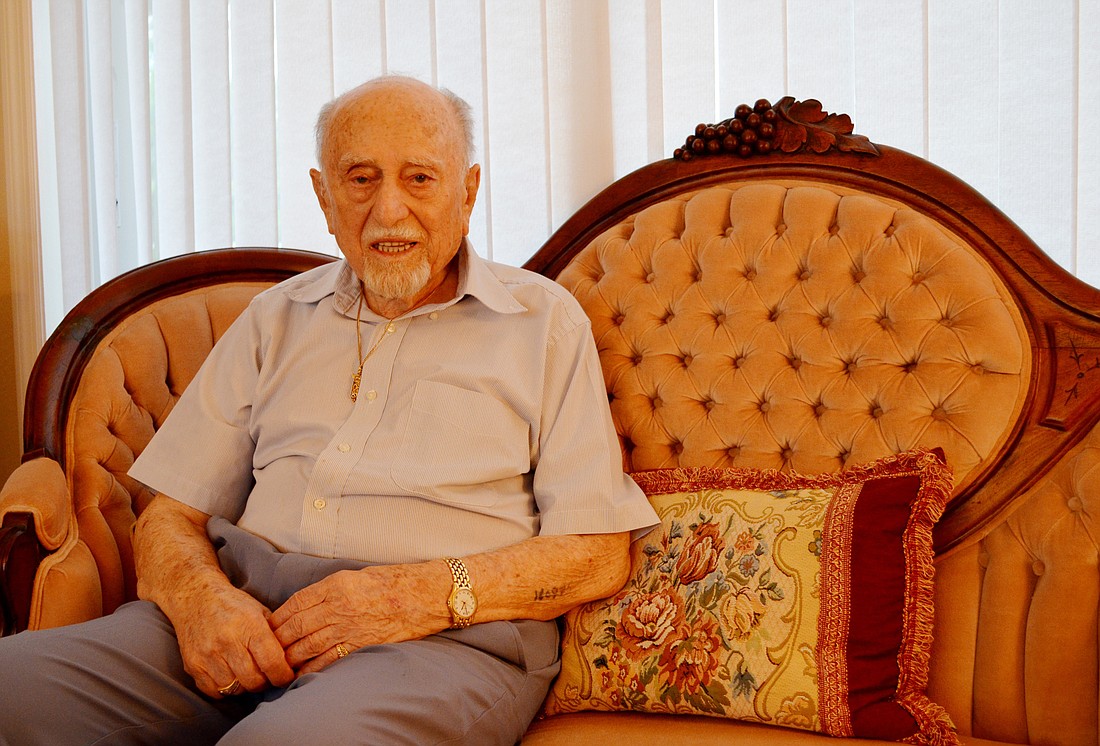- April 28, 2024
-
-
Loading

Loading

Yom HaShoah, or Holocaust Remembrance Day, starts when the sun sets April 15 and concludes at sunset the following evening. But for Sarasota resident and Holocaust survivor Jacob Brodman, every day is a constant reminder of the brutality he endured during World War II.
On April 24, Brodman will blow out the candles for his 95th birthday, but his memories of his time in concentration camps starting at age 19 remain as vivid as ever.
Before the war
Life in 1920s Poland was prosperous for the Brodman family, which ran a lumber business in the town of Grybow near the border of then Czechoslovakia. The family was respected, and Brodman’s father, Eliosz, was an elder for the Jewish community in the area. Eliosz and Anya Brodman had a total of five children, two daughters and three sons: Rujia, David, Manya, Jacob and Abraham.
But shortly after 1939, the family members, like many, were separated from one another. The lumber business was confiscated, and Brodman was sent to work to make soles for shoes in a factory.
“Everything was gone,” Brodman said. “We sold things to be able to live. We had two cars. We sold one, and the other one they took it away, the Germans.”
One Gestapo officer held a grudge with Brodman’s father after a confrontation. From a window in a nearby building, Brodman witnessed the shooting of his father, execution-style, in a courtyard below.
During Auschwitz
After working at the factory, Brodman was put on a train not knowing where he was headed because they couldn’t see out of the railcar. He vividly remembers the last day he saw his mother, two sisters, cousin and aunt.
They were coming off of a railroad car and being split into two lines. To the right went him and his brothers to mine coal and build scaffolding. To the left went the women. Brodman later learned they were killed in a gas chamber.
Brodman and his older brother, David, and younger brother, Abraham, were sent to Auschwitz-Birkenau. Brodman credits his survival to a gesture on his first day there.
“They asked if anyone could sew a glove and I raised my hand,” he said.
Having no prior experience as a tailor, Brodman improvised and taught himself.
In addition to labor during the day Brodman stayed up nights to sew and repair articles of clothing for the Nazi guards. In return he was given extra helpings of food that he shared with his brother and bunkmates.
In January 1945 Brodman was sent to Buchenwald in Germany on a death march with other prisoners. Brodman was aware of the likelihood of their survival and took his chances — he, his brother, David, and two others left the line to hide. They hid in the woods for eight days and eventually came across an abandoned cabin.
Two Nazis found them, and, unaware of their identities, took them to a nearby village. Two American officers ordered an evacuation of the village, and Brodman’s group hid in a barn.
“Two or three minutes later, a cannon smashed the whole wall,” he said.
The men narrowly escaped a bombing.
Post war/Sarasota
After being liberated by American soldiers, Jacob and David Brodman went to the U.S. Brodman landed in New York where he met the woman who would become his first wife, Anya. He put his self-taught tailor experience to use and took classes in upholstery and interior design. Together, he and his wife opened a furniture store.
The decision to move to the Gulf Coast of Florida came after a trip in 1971 to the mineral springs in North Port. He decided the city life was too much for him, and they settled in Sarasota.
Brodman shares his story throughout the community to teach others about the brutally of the Holocaust and the resilience of survivors. On Saturday, Temple Beth Sholom honored Brodman and recognized the 70th anniversary of his liberation.